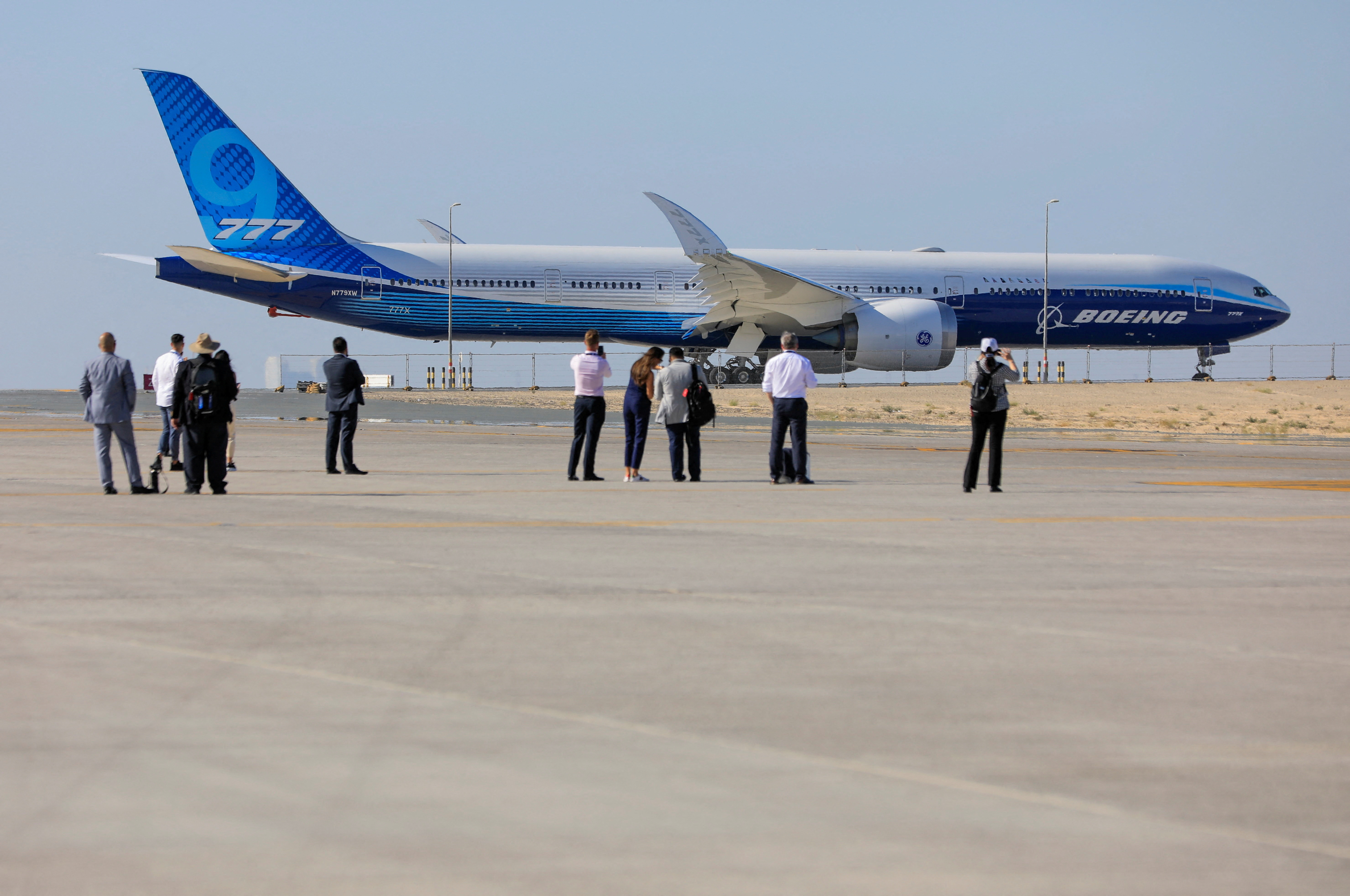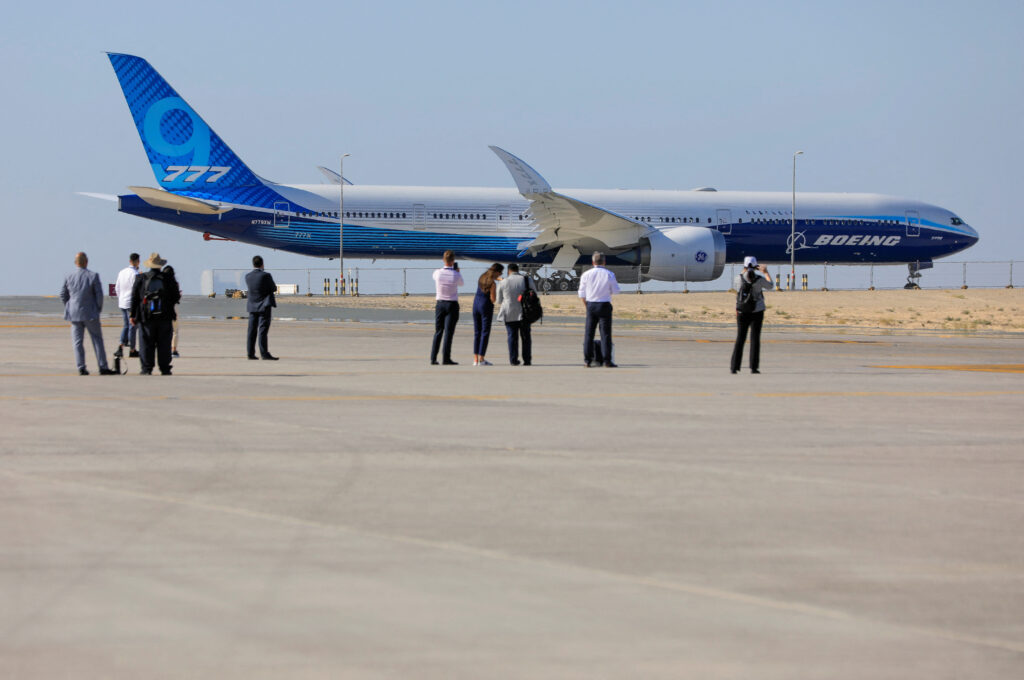
Visitors stand in front of the plane Boeing 777X during the Dubai Airshow, in Dubai, United Arab Emirates, November 14, 2021. REUTERS/Rula Rouhana/File Photo Acquire Licensing Rights
DUBAI, Nov 13 (Reuters) – Middle East carriers look set to order tens of billions of dollars of long-haul jets at the opening of the Dubai Airshow on Monday, as Emirates renews confidence in the delayed Boeing 777X while facing new competition from rivals such as Turkish Airlines.
Hosts Emirates and sister airline flyDubai are expected to stamp their mark early on the world’s second-largest aerospace event, industry sources said, despite concerns about a drop in the economically key travel sector due to the war in Gaza.
That includes a new order for 90 Boeing 777X jets, they said – a significant boost for a programme beset by ongoing uncertainty over the schedule for the world’s largest twin-engined jet, currently expected in 2025 after a five-year delay.
Potentially worth close to $40 billion at list prices depending on the sub-model chosen, the showcase order would put a flag down ahead of emerging competition from Saudi Arabia and ambitious plans by airlines in Turkey and India, experts said.
Emirates and Boeing (BA.N) declined to comment.
A parallel order from Emirates for the competing Airbus (AIR.PA) A350 appeared to be on hold as last-minute negotiations focused on the terms of an engine deal with Rolls-Royce (RR.L), industry sources said. None of the companies agreed to comment.
Demand for the industry’s biggest jets that dominate the region’s airports is humming after a prolonged cyclical downturn followed by the damaging effect of COVID-19 on long-haul travel.
Industry officials estimate airlines worldwide are negotiating behind the scenes to buy some 700-800 new jets, including 200-300 of the world’s largest, as they catch up on fleet replacement plans set aside during the pandemic.
How many of those bear fruit in time for the Nov. 13-17 show depends on the state of negotiations and jockeying for the limelight as Gulf groups face a widening circle of competition.
Turkish Airlines (THY) (THYAO.IS) burst onto the show’s agenda on Saturday with word from state-run Anadolu news agency that it was in talks to buy up to 355 Airbus jets.
Industry sources said the airline could announce at least part of the deal on Monday. It has said it is in discussions for as many as 600 planes overall, split between Airbus and Boeing.
One Mideast source described the prospect of a Turkish order as a “bold move” coming in the backyard of Gulf rivals.
LOWER BOOKINGS
FlyDubai, which flies Boeing 737 MAX medium-haul jets, is also set to order more plane on Monday, sources said. The airline did not immediately respond to a request for comment.
However, speculation of a large Dubai order for narrowbody jets from the region’s newest player, Saudi Arabia’s Riyadh Air, as early as Dubai is premature, other sources said.
The airline, which has hinted at a decision in coming weeks, declined to comment.
Emirates is the world’s largest user of wide-body jets, including Airbus A380 superjumbos and current-generation Boeing 777s. It has publicly said it is considering more orders of the upgraded 777X as well as the Airbus A350 and smaller Boeing 787.
Of these, the 787 is least likely to feature immediately.
People familiar with the flagship 777X have said the risks are weighted toward further delays as Boeing first gauges the impact of tighter certification rules on other projects. Boeing said on Friday there was no change to its schedule.
Dubai is staging the biennial aerospace pageant against the backdrop of the Israel-Hamas war in Gaza that is pushing up demand for weapons and closing airspace, making flights longer and more expensive for some airlines.
Travel analysis firm ForwardKeys said on Friday flight bookings had fallen around the world since Oct. 7.
Bookings to the Middle East have slumped 26%, it said.
“There’s enough statistical evidence, at least in the short term, to show that there’s been a substantial drop in tickets sales into the region,” said Daniel Silke, director of Cape Town-based Political Futures Consultancy.
Analysts have said the war in Gaza is also likely to reinforce demand for weapons on top of a surge in the past 18 months as the United States and its allies rearm Ukraine against Russia. However, few major arms deals are expected at the show.
Reporting by Tim Hepher, Alexander Cornwell, Pesha Magid; editing by Hugh Lawson, Lisa Shumaker and Shri Navaratnam
: .


